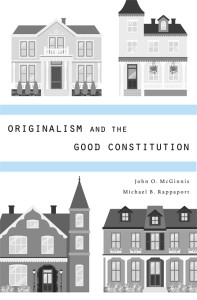In his series of essays during the ratification debates, the Anti-federalist writer Brutus repeatedly warned about the dangers of centralized power, predicting the proposed federal government would end up exercising “infinite” and “incomprehensible” power.
Like everyone else, Brutus didn’t get everything right. But some of what he predicted may sound absolutely prophetic.
However, it wasn’t. He – like many others at the time – was a student of both history and human nature. In his fourth paper, for example, Brutus warned that “power, lodged in the hands of rulers to be used at discretion, is almost always exercised to the oppression of the people.”
Even in those situations where centralized power seems to do the right thing in support of the Constitution and liberty – which is increasingly rare – the combined problems of the nature of power and human nature means that eventually someone else will come along and wield all that same power in ways totally destructive to liberty.
Necessary and Proper
Brutus warned that the Necessary and Proper clause – combined with the Preamble and the General Welfare clause would lead to unlimited power.
The inference is natural that the legislature will have an authority to make all laws which they shall judge necessary for the common safety, and to promote the general welfare. This amounts to a power to make laws at discretion: No terms can be found more indefinite than these, and it is obvious, that the legislature alone must judge what laws are proper and necessary for the purpose.
He warned that the government would see pretty much everything as necessary or proper – or both.
It is, perhaps, utterly impossible fully to define this power.
As a result, instead of a federal government limited to “few and defined” powers, Brutus warned that a combination of taxing power and the necessary and proper clause would lead to a government with nearly “infinite” and “incomprehensible” power.
General Welfare/Taxing Power
Continuing the same theme, Brutus took the “general Welfare” clause to task. He warned that virtually anything and everything would eventually be regulated and taxed. What follows is a long passage, but really hammers home this view:
This power, exercised without limitation, will introduce itself into every corner of the city, and country-It will wait upon the ladies at their toilett, and will not leave them in any of their domestic concerns; it will accompany them to the ball, the play, and the assembly; it will go with them when they visit, and will, on all occasions, sit beside them in their carriages, nor will it desert them even at church; it will enter the house of every gentleman, watch over his cellar, wait upon his cook in the kitchen, follow the servants into the parlour, preside over the table, and note down all he eats or drinks; it will attend him to his bed-chamber, and watch him while he sleeps; it will take cognizance of the professional man in his office, or his study; it will watch the merchant in the counting-house, or in his store; it will follow the mechanic to his shop, and in his work, and will haunt him in his family, and in his bed; it will be a constant companion of the industrious farmer in all his labour, it will be with him in the house, and in the field, observe the toil of his hands, arid the sweat of his brow; it will penetrate into the most obscure cottage; and finally, it will light upon the head of every person in the United States. To all these different classes of people, and in all these circumstances, in which it will attend them, the language in which it will address them, will be GIVE! GIVE!
Like his warnings about the judicial power, Brutus considered “general welfare” to be a major problem for liberty because the phrase is unclear and hard to define for most people. As a result, politicians on opposing sides of the same issue could simultaneously claim they are acting in support of the general welfare.
To provide for the general welfare, is an abstract proposition, which mankind differ in the explanation of as much as they do on any political or moral proposition that can be proposed; the most opposite measures may be pursued by different parties, and both may profess, that they have in view the general welfare; and both sides may be honest in their professions, or both may have sinister views.
Brutus also predicted that a “general and unlimited” power to borrow money combined with an easy-to-abuse necessary and proper clause would lead to “a national debt, so large, as to exceed the ability of the country ever to sink.”
In fact, Brutus warned that creating a massive national debt might be the worst situation the country could ever find itself in.
I can scarcely contemplate a greater calamity that could befal this country, than to be loaded with a debt exceeding their ability ever to discharge. If this be a just remark, it is unwise and improvident to vest in the general government a power to borrow at discretion, without any limitation or restriction.
Brutus also warned against large, permanent standing armies, having too few representatives, and a judiciary that he predicted would “mould the government into almost any shape they please.”
Ultimately for Brutus, the root issue underlying all these problems was consolidation, or centralization of power.
For Brutus, and many other founders, consolidation leads to abuse of power, law being little more than, as Thomas Jefferson put it, “the tyrant’s will,” factions and infighting among the people, and a government based on corruption, bribery, force and coercion.
He may have summed it up best in his first paper:
“In so extensive a republic, the great officers of government would soon become above the controul of the people, and abuse their power to the purpose of aggrandizing themselves, and oppressing them.”
Sounds pretty familiar, doesn’t it?




